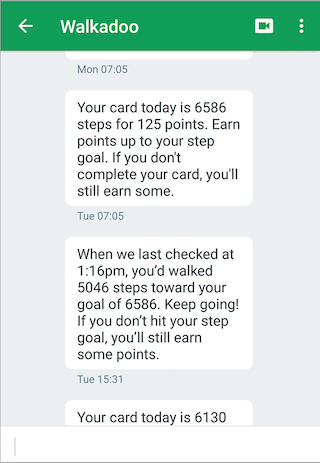 Wellness company Healthways, through its subsidiary MeYou Health, has completed a randomized control trial demonstrating that their own employees using their Walkadoo platform -- consisting of adaptable, tailored reminders -- and Fitlinxx Pebble activity trackers walked an average of 970 steps per day more than a control group with just the trackers.
Wellness company Healthways, through its subsidiary MeYou Health, has completed a randomized control trial demonstrating that their own employees using their Walkadoo platform -- consisting of adaptable, tailored reminders -- and Fitlinxx Pebble activity trackers walked an average of 970 steps per day more than a control group with just the trackers.
Johns Hopkins physicians were also on the research team. The study was published online in the Journal of Medical Internet Research.
“A strength of this trial was its pragmatic approach in a real-world workplace setting,” researchers wrote. “We recruited trial participants from an employee population who received Walkadoo as part of their workplace wellness program offering. Our findings add to the evidence that physical activity interventions can be effective in the workplace where employees tend to sit at their desks for long periods. This program was effective despite not being designed specifically or exclusively for workplace implementations. We demonstrated that an adaptive program can be automated and made scalable using a simple wireless activity tracker.”
The trial, which was randomized but not blinded, split 265 Healthways employees between the intervention and control groups, controlling for self-reported activity levels prior to the trial. They also gave participants a one-week shakedown period to eliminate any subjects that didn’t consistently wear the tracker. They tracked users’ steps over six weeks.
With Walkadoo, users track their steps with a pedometer or activity tracker, either a Pebble or another device they've purchased, like a Fitbit or Jawbone (for this trial, all participants were required to use a Pebble provided to them free of charge). The Walkadoo software uses that step data to suggest achievable goals that can adapt as the software learns more about the user's walking habits. Even if the user doesn't have a smartphone, Walkadoo can send them a daily step goal by email or text message. On the Walkadoo website, users can interact socially or engage in walking challenges in small groups.
In the Walkadoo intervention group, steps per day increased an average of 309 steps over the six week period. For the control group, steps per day decreased by an average of 661 steps. Researchers theorize that just having the trackers may have boosted the control group’s initial step count (the so-called sentinel effect) and the drop could reflect a regression to baseline. Alternately, the timing of the study, between summer and fall, could have corresponded to a natural drop in activity.
The biggest potential bias in the study is the use of Healthways’ own employees, a population that could have a vested interest in proving out their own product, as well as being generally more interested in wellness than the average person. Researchers also recognized the relatively short follow up period — six weeks — noting that “sustainability of the effect remains to be demonstrated”.

















